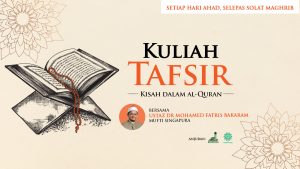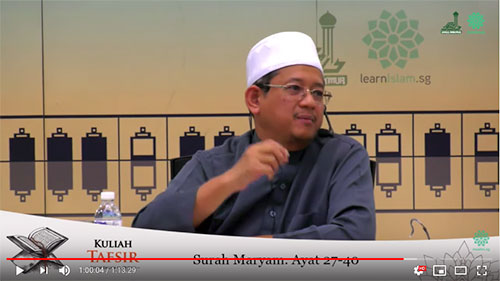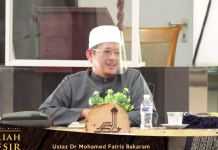This article is a summary of takeaways from Ustaz Dr Mohamed Fatris Bakaram’s Tafsir Lecture at Darul Makmur Mosque on 15th December 2019. It comprises two sections: (1) A Q&A session regarding last week’s session and (2) a Tafsir of Surah Maryam, verses 27 to 33.
Q&A Session for verses covered on 08th December 2019
On Divorce during Pregnancy
Q: We learnt in the previous lesson that the duration of pregnancy are the most vulnerable moments of a woman’s life. She is the most in need of the presence and support of her husband during this period. You mentioned that a husband should not even leave his wife during the period of pregnancy for a long duration. In that case, is divorcing a wife during pregnancy haram?
A: I will not answer this question with respect to any incident that has happened recently. Rather, whatever answer I give is on a general basis.
As a side note, there is a term in the rulings of Divorce (Talaq) in Islam called Talaq Bid’iy (الطلاق البدعي) – this refers to divorcing a wife during her menstrual period. The term Bid’ah refers to something that is forbidden (haram) by the religion. Divorcing of a wife during her period is haram.
Unlike divorce during a woman’s period, there is no specific ruling (or hukum) regarding the divorce of a woman during pregnancy. However, we can apply a general ruling to this situation. In Islam, any act that brings harm to another person can be considered as haram. This is evidenced in the following hadith:
ضَرَرَ وَلَا ضِرَار
There should be neither harming (darar) nor reciprocating harm (dirar).
This hadith is used by Fiqh scholars in general when applying rulings in all areas. The only exception for this hadith is when the harm cannot be avoided at all costs. Based on this ruling, we conclude that if the act of divorcing a pregnant wife brings harm to her, then this act can be considered forbidden (haram).
Is there any situation where the divorce of a pregnant wife is not harmful for her? Of course not! Any divorce of any woman, pregnant or not, will bring distress to her. What more can you expect when we look at the state of a woman who is pregnant? As mentioned in the Qur’an, she will be in a state of vulnerability, physical weakness and emotional turmoil. How can divorce not be harmful to her in such a situation? In my opinion, I would consider divorce during pregnancy forbidden.
Furthermore, all verses in the Qur’an that talk about divorce deal with 2 things: Ma’ruf (goodness and kindness) and Ihsan (excellence and perfection). A divorce that is Ma’ruf is one that occurs in the best possible circumstances, ensuring that parties involved are fully respected and honoured and that neither harm nor suffering is incurred. This condition is applied for all divorce in general, whether or not the wife is pregnant. Evidently, divorcing a wife during her pregnancy goes against this teaching of having a divorce that is Ma’ruf.
On the Validity of Marriage during Pregnancy
Q: There have been messages being passed via social media which claim that a woman who gets married while she is pregnant (with a child conceived out of wedlock), has an invalid marriage (nikah). This message then claims that her invalid marriage puts any intercourse with her husband at the same status as adultery (zina). Ultimately, any child that results from such a relationship is therefore a product of zina and as a result, when the child gets married eventually, her own marriage would be invalid and this process repeats itself over generations. What is the truth behind this message?
A: We need to be conscious and careful before we share things that we find online. At times, what is being shared is not the truth. When untruths start getting shared, people come to misguided conclusions and this brings about much harm to the community.
We need to distinguish between two situations: (1) pregnancy conceived out of a legal marriage (2) pregnancy conceived out of wedlock
A woman belonging to the former situation (i.e. she becomes pregnant during her marriage) may get divorced by her husband- either by his death or by his declaring of Talaq. She will be in the period of waiting (‘iddah) after separation from him. During her ‘iddah, she is forbidden from getting remarried until she has delivered the baby. If, during the period between the pronouncement of Talaq and childbirth, her husband decides to take her back in, she is not divorced and there is no ‘iddah.
When a woman belongs to the latter situation (i.e. she is pregnant due to zina outside of marriage), there is no such thing as an ‘iddah. Is marriage during pregnancy in such a situation, considered legal in Islam? The scholars hold different opinions in this aspect. Some scholars maintain that even though she may not have an ‘iddah, it is still not legal for her to get married while she is pregnant. The Shafi’i Mazhab however, holds the opinion that it is valid (sah) for her to get married while still pregnant, considering that she has never been previously married.
In the Malay community, we hear of occasions when a woman is found to be pregnant out of wedlock and is asked to get married in order to protect her honour from the criticism of people. Whether or not doing this is the best move is out of question. What should be known is that during preparations for the marriage, the kadi is made aware of the situation. He will then make an analysis on a case-to-case basis to decide if the marriage should proceed. If he decides that the marriage is permissible, then the nikah that happens will be valid. Any child born out of it will not be considered to be born out of wedlock.
On saying “Na’uzhu billah”
نَعُوْذُ بِاللّٰهِ مِنْ ذٰلِك
We seek refuge with Allah from that
Q: I have been told, based on a post that has been spreading on Facebook that we should always say “Na’uzhu billah min zalik”, meaning “We seek refuge from Allah from that”, in full. It is claimed that when say “Na’uzhu billah”, we are asking to be distanced from Allah. How true is this post?
A: The misunderstanding of the meaning behind this phrase needs to be clarified immediately. The understanding that “Na’uzhu billah” holds the meaning of ‘May we be distanced from Allah’ comes from a mistranslation of the phrase from Arabic. The words ‘billah’ does not actually mean ‘from Allah’- rather, it means “by Allah”. Using the phrase “Na’uzhu billah” therefore holds the same meaning as the phrase “Na’uzhu billah min zalik” in that it is a means for us to seek refuge from Allah from all that is harmful.
I urge all of you to be careful when accepting and propagating whatever news that you find online. When it comes to issues such as mistranslations, the impact of spreading the message may be limited. However, when issues such as the Fiqh rulings are miscommunicated, larger repercussions may occur. This can be seen in the issue of marriage during pregnancy out of wedlock. People are affected by the idea that their marriage (which had in fact been validated by a qualified scholar) may have been invalid. When false rulings are spread, communities of people are impacted with uncertainty and unnecessary stress. Take heed and pause before you share anything for which you may not be certain of its validity.
Continuation of the Story of Maryam AS
Verses Explained
فَأَتَتْ بِهِ قَوْمَهَا تَحْمِلُهُ ۖ قَالُوا يَا مَرْيَمُ لَقَدْ جِئْتِ شَيْئًا فَرِيًّا
Then she came to her people carrying him (the baby). They said, “O Maryam you have committed something grave indeed. [19:27]
Having already given birth to Prophet Isa AS, Sayidatina Maryam AS brought him back to the village to confront the people of the town. Despite her initial thoughts of despair, Sayidatina Maryam AS set aside her fears and boldly brought her newborn baby to the village. She stepped forward to confront whatever challenges that Allah may put in her path.
The word “Fariyya” used here implies something grave, huge and unacceptable to people.
يَا أُخْتَ هَارُونَ مَا كَانَ أَبُوكِ امْرَأَ سَوْءٍ وَمَا كَانَتْ أُمُّكِ بَغِيًّا
O sister of Harun, in no way was your father a woeful person, and in no way was your mother unchaste.” [19:28]
The people hurled criticism at Sayidatina Maryam AS, bringing up her parents’ piousness, implying that she had tarnished the family’s reputation.
In this verse, Sayidatina Maryam was referred to as “sister of Harun”. It is important to clarify that “Harun” here does not refer to Prophet Harun AS, who was said by scholars to have lived 500-600 years before prophet Isa AS’s birth.
In a hadith narrated by Muslim, a companion was sent by Prophet Muhammad to spread the message of Islam. He returned to the Prophet saying that he had been questioned about how Muslims could believe that Sayidatina Maryam was “sister of Harun”. Prophet Muhammad ﷺ informed the companion that it was a common practice for the people of Bani Isra’il to name their children after the prophets of the past, as a sign of respect and honour to the prophets.
‘Harun’ in this verse in fact refers to a pious man, who was raised in Baitul Maqdis by Prophet Zakariya AS, just as Maryam AS had been. He lived in the time of Maryam AS and was respected and honoured by the people, just as she had been. The people therefore regarded them as having the same status, like siblings. The people found it appalling to think that someone with a status like Harun could have performed such a great sin.
فَأَشَارَتْ إِلَيْهِ ۖ قَالُوا كَيْفَ نُكَلِّمُ مَن كَانَ فِي الْمَهْدِ صَبِيًّا
So, she pointed towards him (the baby). They said, “How shall we speak to someone who is still a child in the cradle?” [19:29]
قَالَ إِنِّي عَبْدُ اللَّهِ آتَانِيَ الْكِتَابَ وَجَعَلَنِي نَبِيًّا
“He [Isa] said: Verily! I am a slave of Allah, He has given me the Scripture and made me a Prophet; [19:30]
وَجَعَلَنِي مُبَارَكًا أَيْنَ مَا كُنتُ وَأَوْصَانِي بِالصَّلَاةِ وَالزَّكَاةِ مَا دُمْتُ حَيًّا
He has made me a blessing wherever I go, and bid me to establish prayer and give alms-tax as long as I live, [19:31]
وَبَرًّا بِوَالِدَتِي وَلَمْ يَجْعَلْنِي جَبَّارًا شَقِيًّا
and to be kind to my mother. He has not made me arrogant or defiant. [29:32]
When confronted with the accusations made against her, Maryam AS did as she had been instructed in verse 26 of Surah Maryam- she held onto her vow and remained silent, pointing at the baby. Her son, Prophet Isa AS spoke up and introduced himself to them on her behalf. Prophet Isa AS’s speech demonstrated the miracle of his birth.
In comparative religion, we can see that there is a difference between how Prophet Isa AS (or Jesus) is viewed from the lens of each religion. Jews do not accept Prophet Isa AS, they claim that Jesus had been borne out of wedlock (from zina) and that he had therefore been impure. Christians claim that Jesus is the son of God and a component of the Trinity (i.e. Father, Son and Holy Spirit). As Muslims, we believe that Jesus was a servant and prophet of Allah (as seen in Surah Maryam, verse 30).no
The act of giving alms (Zakat), has been a practice that has existed even in the time of Prophet Isa AS. However, the form in which it was implemented (i.e. the amount, the frequency, the recipients etc.) may have differed from the Zakat practiced by Muslims today. Up until today, Christians are known to make regular contributions to the church. As Muslims, we are taxed with Zakat once a year. We donate 2.5% of our savings (money that has been set aside and not used), for Zakat.
وَالسَّلَامُ عَلَيَّ يَوْمَ وُلِدتُّ وَيَوْمَ أَمُوتُ وَيَوْمَ أُبْعَثُ حَيًّا
And peace be upon me, the day I was born, and the day I die, and the day I am made to rise again alive.” [29:33]
This verse mirrors verse 15 of Surah Maryam, regarding Prophet Yahya AS. Just as Yahya AS had been a prophet, so too was Isa AS.
An issue is raised when this verse was revealed. According to the Christian believe, Jesus had been crucified and then resurrected. According to the Muslim belief however, Prophet Isa AS had not been killed. Rather, he was raised to another world- Prophet Isa AS did not die. In this verse however, we learn that Prophet Isa AS had salaam on the day he dies, implying that he did die. How then can we reconcile this seeming contradiction? We will deal with this matter in detail in the upcoming session, in syaa Allah.
(To be continued…)
Summary by: Arina Adom
Arina Adom is a lover of learning who takes on the world with an open mind. Resourceful and adaptable, always ready to take on new challenges. Comfortable working with diverse groups of people, yet able to work independently. Thrives under pressure. Currently seeking a meaningful career that enables me to impact lives directly and bring about positive changes in the lives of others in the community.
Arina graduated with a degree in Science ( Hons ), Life Science from NUS and is currently a Research Assistant at Evolutionary Biology Lab ( NUS ). She is currently taking a diploma in Quran and Sunnah Studies from Al Zuhri.
Watch Mufti’s Kuliah Tafsir again at
MUSLIM SG Youtube
Watch and follow MUFTI classes weekly
every Sunday after solat Maghrib











